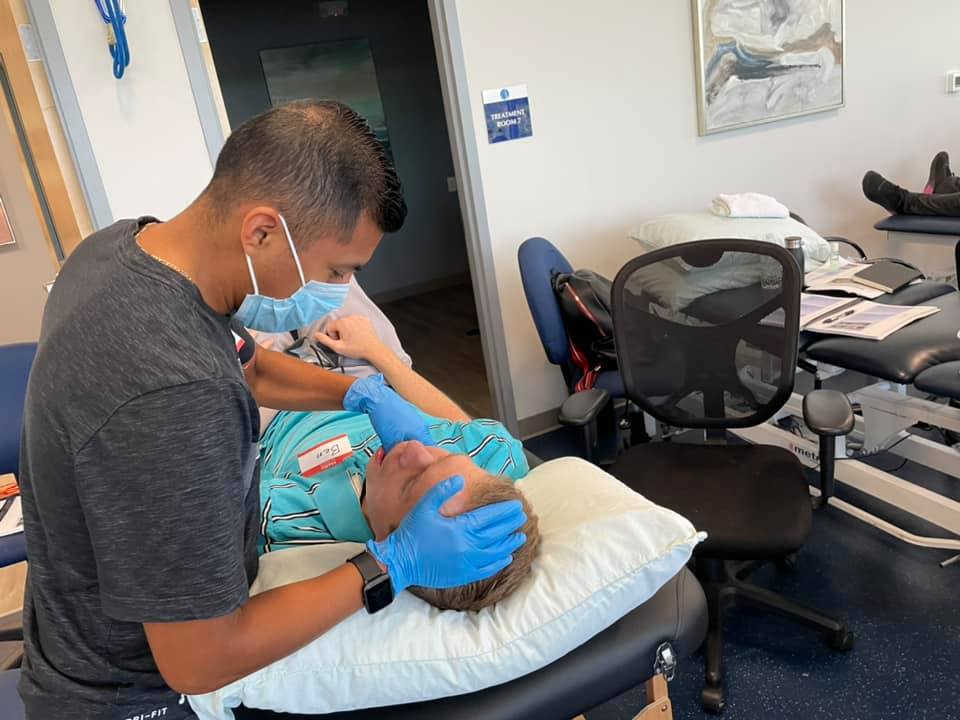As always, thanks for taking the time to read my blog post! My goal is always to be generous with my knowledge and experience so you can grow and improve your own practice.
One of my greatest joys since 2005 has been building a leading specialty practice in our geographical region – and we are now widely considered to be the leading specialty providers for Pelvic Floor and TMJ craniofacial disorders by practitioners in this area.
I recently had a light bulb moment when I was reflecting on how we got to this point. We have made some costly mistakes in the past and it occurred to me that we had tried to reach our goals by starting at the top of the ladder instead of the bottom – we had it backwards all along.
For many years we would encourage our general PTs to attend courses we were hosting in either Pelvic Floor or TMJ in an attempt to build on our specialty practice. After all – they will get some additional CEUs!
As we looked back over the years, it was only a small percentage of clinical staff that developed a passion for the specialty after taking the course and actually ended up adding these specialty patients to their caseloads. Why? Was it that they just wanted some CEUs and were not interested in the content? Were they overwhelmed by the content in the class and did not feel adequately prepared to work with the specialty population? Were they intimidated by the personal nature of the treatment and having to perform internal oral, vaginal or rectal treatments? Well, truth be told, it is probably a bit of all these things.
I’m excited to share here with you the benefits of becoming a specialty practice and the steps for training and developing your clinical team to become specialists!
Expand Service Offerings and Expertise
- Wider Range of Patient Care: Specialization allows you to cater to more specific patient needs, addressing complex conditions like pelvic pain, TMJ dysfunction, or chronic musculoskeletal issues. By having therapists with unique expertise, you can provide solutions that other generalist clinics may not.
- Increased Market Differentiation: Offering services like pelvic floor therapy or TMJ, which are less common, distinguishes your clinic in a crowded market. Patients seeking specific treatments will gravitate toward your clinic because of your specialized knowledge.
- Deeper Community Impact: Specialized services enable you to build stronger relationships with niche patient populations in your community, who often seek experts for their specific conditions.
Enhance Referral Networks
- Broader Medical Referrals: By having specialists, you can receive referrals from a wider range of healthcare professionals, such as gynecologists, urologists, dentists, oral surgeons, and ENTs in addition to primary care physicians and orthopedic surgeons.
- TMJ specialists can work closely with dentists and oral surgeons.
- Pelvic floor therapists can establish referral relationships with gynecologists, obstetricians, and urologists.
- Manual therapists and orthopedic specialists often collaborate with sports medicine doctor and orthopedic surgeons.
- Increased Referrals: More doctors will view your clinic as a comprehensive solution for their patients, leading to an increase in high-quality referrals. Surgeons and dentists, in particular, look for specialized post-operative or non-invasive care options for their patients.
Steps to Develop Specializations within Your Existing Staff
Identify Existing Talent: Start by evaluating the current certifications, interests, and experiences of your staff. Some therapists may already have a background or interest in specific fields like pelvic floor therapy or manual therapy.
Although the traditionally accepted path for those expressing an interest in specialization is to seek specialized education or certification, real-world experience has taught me that an in-house evaluation should be the first course of action:
- Step 1: Arrange an Interview
Sit down with the prospective specialist candidate and discuss what it would be like to work with the patient populations for the specialty they are interested in. What is it like to work with those patients? What are their common personality types? What conditions do these patients commonly have? How long will treatment last for the typical patient? How long will they need to spend with each patient in that specialty? What types of equipment will be required? What types of challenges can they expect? What non-clinical attributes will they need to cultivate in order to work with these patients (empathy, patience, calm demeanor, simple approach, etc.)?
- Step 2: Shadow a Specialist
Have the candidate shadow a therapist who works in the specialty they are interested in while they treat patients. Have them observe some typical interactions with patients within that specialty so they can understand the challenges these patients face and the outcomes that can be expected with therapy.
- Step 3: In-House Training
Conduct supervised in-house training, with the candidate actually seeing patients within that specialty, so they can develop real-world expectations as to what it is really like working with these patients requiring this specialized treatment expertise.
- Step 4: Education
With the candidate now possessing a firm, real-world understanding of providing specialized therapy, they should enroll in a formal program or course to receive certification in that specialty. With the history of Steps 1 through 3, they should be able to absorb and make better sense of the information; gaining skills more quickly and with the appropriate amount of energy and excitement to see it through.
- Step 5: Start seeing patients in that specialty
It has taken me 19 years to recognize that only a very small percentage of clinicians expressing an interest in specializing actually stick with it. However, for those who do, the gratification of focusing on a niche patient population while becoming a well-regarded clinician within a particular specialty is especially rewarding.
By developing a strong team of specialists, your clinic can become a go-to destination for specific needs, strengthening your market position and fostering long-term growth.


Recent Comments